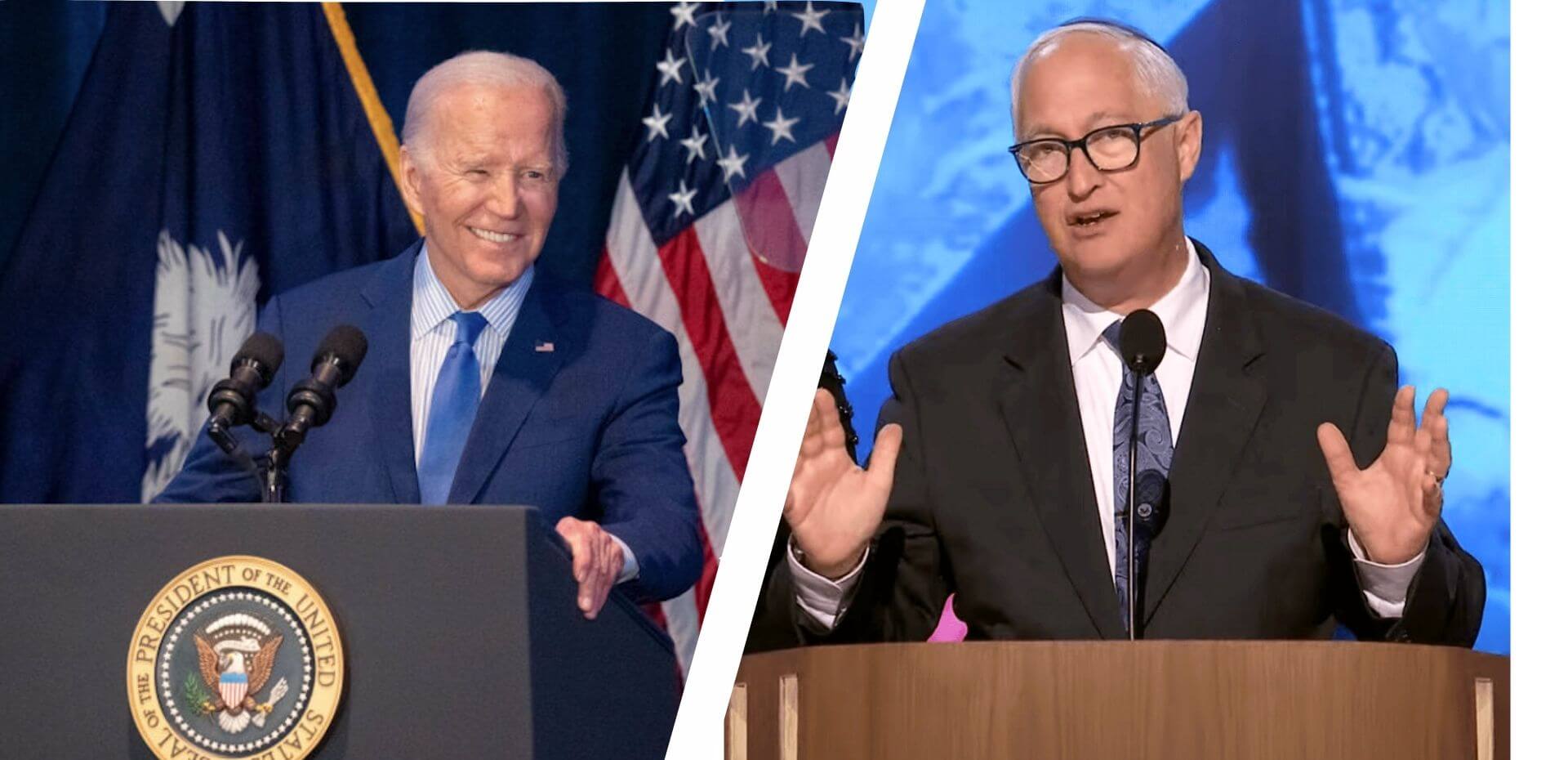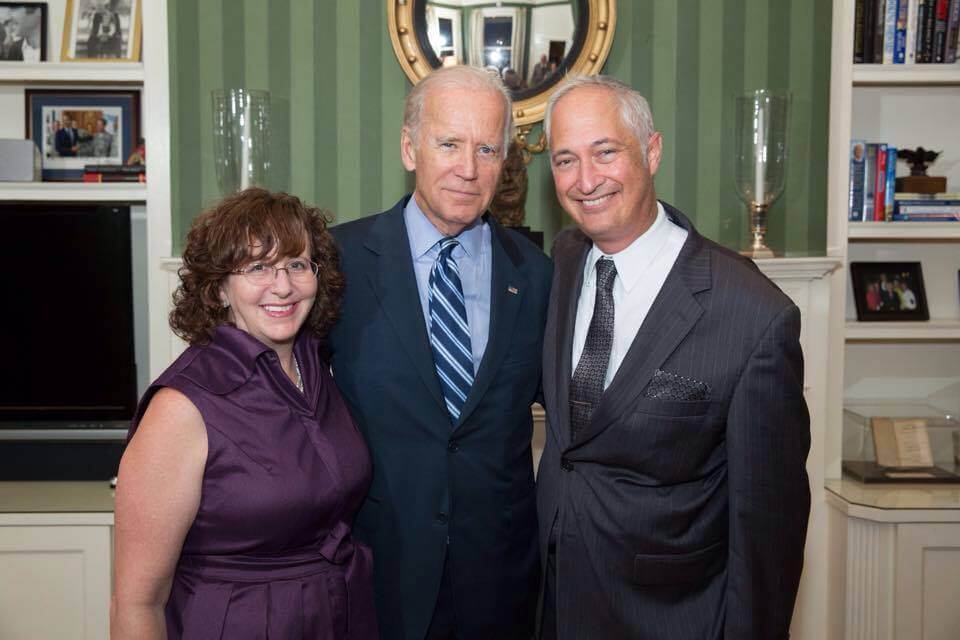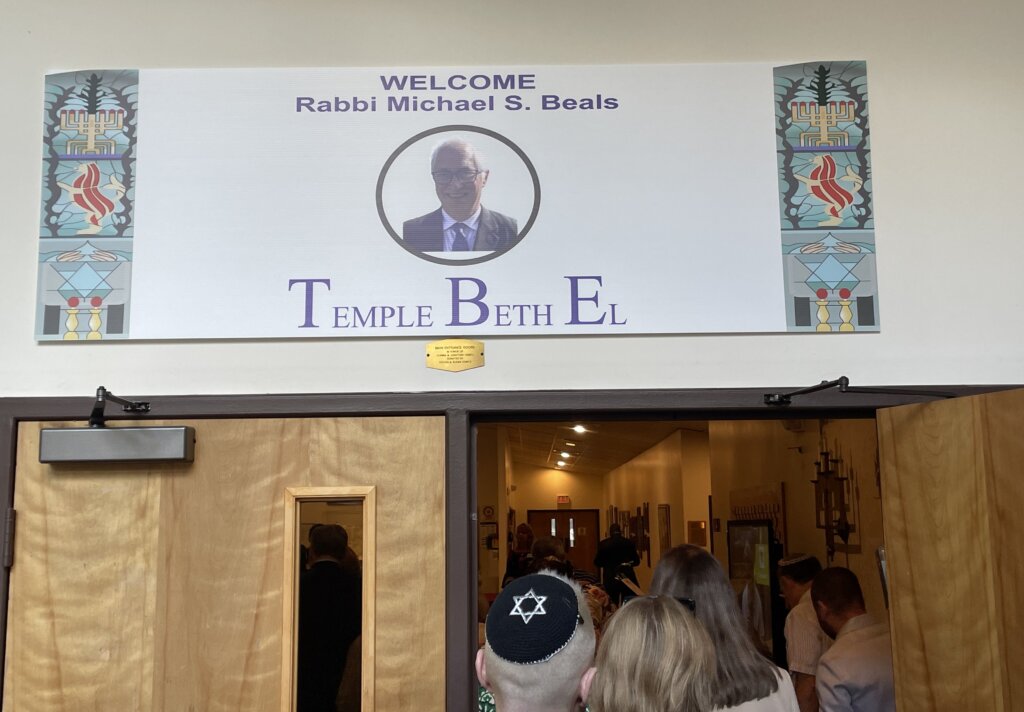Biden and his rabbi were both set to retire. But one has opted for a new job.
Rabbi Michael Beals, who is starting a new job at a Delaware congregation, said he hopes to play a key role in documenting Biden’s legacy

President Joe Biden and Rabbi Michael Beals. Photo by Getty Images/CSPAN
DELAWARE — President Joe Biden and Rabbi Michael Beals, whom he calls his rabbi, both faced retirement this July, stepping aside to make room for younger leadership. Beals, 61, who led Wilmington’s Congregation Beth Shalom for two decades, said on Sunday he sees his fate intertwined with Biden’s as they enter new chapters, though he’s already embarked on a new journey.
In his acceptance speech after being installed as the new rabbi of Temple Beth El in Newark, Delaware, Beals expressed hope to play a key role in documenting Biden’s legacy and his relationships with the Jewish community, with the nearby University of Delaware considered a potential site for Biden’s presidential library. “The City of Newark is bound to grow in size and prestige, and Temple Beth El will go right along with it.” Beals said.
Beals — sans jacket, wearing a grey cap and a black floral tie — expanded on that in an hour-long interview at a nearby Spanish restaurant, where he enjoyed a spread of vegetarian dishes: breaded eggplant with feta and honey, sautéed mushrooms with garlic and stuffed dates.
Beals’ relationship with Biden dates back years, but if it were up to his late father, the two might never have met.
Growing up as an only child in San Francisco, Beals’ father, Alan, a London-born printer salesman, was disappointed when, in 1997, Beals chose to become a congregational rabbi. Alan feared his son would face mistreatment from congregants, one he had come to experience. his attitude quickly changed once Beals took on roles, first as senior rabbi at B’nai Tikvah in Los Angeles and then at Beth Shalom in Wilmington. Proudly, the elder Beals created an email address, “[email protected],” often joking that the only difference between them was what they sold.
18 years as Biden’s rabbi

It was at Beth Shalom that Beals first met Biden and became a spiritual confidante. Biden, then Delaware’s senior senator, attended in 2006 a shiva call for Sylvia Greenhouse, a synagogue member who had donated $18 — a number symbolizing life in Judaism — to every one of Biden’s campaigns since his first Senate run in 1972. From that moment, Biden began referring to Beals as “my rabbi.”
As vice president, Biden invited Beals to annual Rosh Hashanah receptions and, in 2015, he asked Beals to represent the Jewish community at the funeral of his son Beau. Beals delivered the benediction at one of Biden’s inauguration events in 2021 and, two years later, Biden appointed Beals to the U.S. Holocaust Memorial Council.
It was fitting that Sunday marked 18 years since Beals first met Biden. In a letter to mark Beals’ new job, the president wrote, “I have been proud to see your leadership in action, benefit from your compassion and spiritual wisdom, and most importantly, call you my friend, and my rabbi.” Biden quoted the Jewish proverb: “What comes from the heart goes to the heart,” to describe Beals’ bond with his congregants and his decades of service to Delaware’s Jewish community. “I have no doubt you will continue to lead with heart,” Biden concluded.
Beals showed his deep compassion for the president when Biden faced pressure to step down after his unsteady performance at the June 27 presidential debate against former President Donald Trump. Beals refused to join the chorus of close friends urging the president to withdraw from the race. He said at the time that “in our Jewish tradition, we don’t say we’re going to scrap the five Books of Moses because by the 120th year he’s not the man he was 40 years ago.”
In Sunday’s interview, Beals said that Biden ultimately made the right decision to step down with humility. “He did what he thought was right for the party and for the country,” Beals said. “And I find him inspirational.”
Last month, Beals delivered the benediction after Biden concluded his address to the Democratic National Convention in Chicago. “It was very, very exciting being the last word,” Beals told me at an after-party hosted by the feminist Zionist group Zioness. “It’s like watching the end of a saga, 50 years of service.”
Beals stated that Biden’s “bravery” in supporting Israel after the Oct. 7 attack is the defining moment of his career. “As important as public opinion is, what is more important is doing the right thing,” he said. “Biden stuck it out.”
‘Make America kind again’

At the installation event, attended by roughly 200 people — including his 90-year-old mother Rita; his wife, Elissa; his children, Ariella and Shir; and statewide officials — speakers highlighted Beals’ kindness as a hallmark of his leadership. “You’re my rabbi, too,” some non-Jewish politicians proclaimed.
Chris Coons, the senior senator from Delaware, donning a large black yarmulke, remarked, “My hope for you is that you will continue to be rooted in Torah, to be inspired by the prophets, to be attentive and connected to your congregation, and that you will continue to challenge all of us who seek to serve the public.”
Matt Meyer, the Democratic gubernatorial nominee and who is a congregant at Beth Shalom, recalled one of Beals’ sermons eight years ago when Trump was first elected, saying, “Let’s make America kind again.”
Beals said he has always tried to preach kindness and would’ve attended the Republican National Convention in July if he had been invited. “I swear to you, had the RNC invited me to come and make a benediction. I’d have gone in a heartbeat,” he said. “If President Trump invited me to do anything, I would do it because it’s not about my politics. My energy comes from a love of our people and a love of Israel.”

















